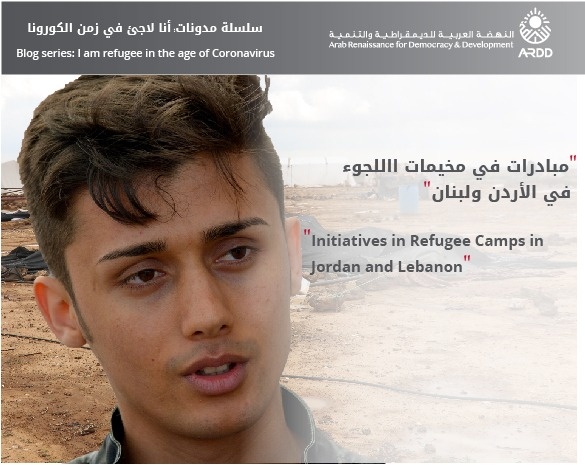In this blog series, ARDD collects voices from refugees in the Arab world with different origins and shares their perspectives and challenges pertaining to the new measures against the further spread of the coronavirus, or Covid-19. The pandemic affects all segments of society worldwide and ARDD aims to shed light on the circumstances of refugees in times of the virus.
Bushra Al Zoubi (26) from Daraa fled Syria in 2012 and lives now in Amman. For her, life has not been easy, but she found her strength in Jordan and shares with us how she deals with today’s situation in quarantine: “These days of quarantine, I know people are drowning in despair and depression, but I am not. I am staying with my family working on my graduation project, reading, improving my Spanish and English skills, helping my brothers, catching up with friends and doing language exchanges. Being productive and seeing the silver lining is a choice and I decided I am going to make the best of it and do everything that I have been putting off owing to being busy. So far, I have finished a book I have been translating with a friend and a big chunk of my graduation project. My family is trying to do productive things as well and being calm about the situation without freaking out. This time is the whole world’s opportunity to think everything through and reflect on the experience of refugees and besieged people because for them the quarantine is a daily routine, and they cannot travel at any time.”
Ali Nasser Hussein (28) from Damascus and lives now (in Za’atari Camp) in Jordan with his wife and 2 daughters. Aside from being a professional kickboxer, he now dedicates his time and efforts in turning old clothes into masks without a sewing machine and showing people how to do the same on Facebook:“I know that masks are widely available, but it is not affordable for everyone. If people learn how to make it themselves, without the need for a sewing machine, it can help them and their family to be protected from the virus as much as possible. Social media is great to teach others how to do it.”
After the first two Covid-19 cases in Gaza were announced, Babyfist, a Palestinian clothing brand, launched a fundraiser with their partner factory (Hasan) in Gaza to make masks for those that need them. So far, the initial goal of raising $15,000 – which allows for the production of 30,000 masks – was reached within 24 hours. The focus on Gaza is of specific concern: “While the globe is struggling to combat the COVID-19 outbreak, Palestinians living under siege in the Gaza strip face exceptionally dangerous circumstances. Under military occupation, Gazans struggle under an air, land, and sea blockade which severely limits their access to healthcare.”
In Jordan, a group of 40 volunteers from Syria started spreading messages to raise awareness on the outbreak of the virus, give hygiene advice and promote staying “home” through social media, in particular through Facebook pages and WhatsApp groups with many Syrian refugees. To avoid the spread of unverified information, the volunteers operate in close coordination with Jordanian UNHCR staff to communicate advice to the refugee population according to international facts and figures. One volunteer shares:
“For us Syrians, not shaking hands and gatherings in big groups is very strange. These traditions are rooted in our culture and come naturally to us. This is why it is important to keep reminding everyone to practice social distancing to protect ourselves and the community.”
Nadia Rdeini (26), a Palestinian refugee from Zahlé in Lebanon teamed up with her friend in China and organized a Skype training session on Covid-19 with Chinese medical staff to share the information with Syrian refugees in Lebanon:
“After the Skype training sessions, we shared the PowerPoint presentation with information on the virus and how to prevent it with focal points inside camps, for them to share it again with as many Syrian refugees as possible through their networks on WhatsApp and Facebook.”


